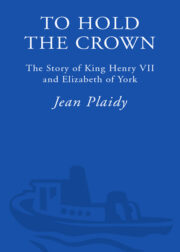After Warwick’s execution Suffolk became uneasy. Warwick had died because of his claim to the throne. His, Suffolk’s, was not so strong but it existed; and he had already shown his antipathy to Henry Tudor.
He thought it might be wise to slip out of the country again with his friends. In secret he had discussed his dissatisfaction with the Tudor rule and it had been suggested to him that the Emperor Maximilian would delight in the discomfiture of the English King and it seemed feasible that he might be ready to help in his downfall.
Suffolk thought: Why should not I be the one to bring about this happy result? I am of the House of York. Ours is the true reigning house.
Moreover Henry Tudor might be a good administrator but he was no soldier. He might know how to fill the exchequer by taking those goods and lands which belonged to others but he would not find it easy to raise an army of inspired men, to be that leader whom people admired and followed without question.
It was not long before the Earl of Suffolk was at the Court of Maximilian where to his great delight he was received as an honored guest and listened to most sympathetically.
This was not quite the same as providing an army, which was what Suffolk had hoped for, and although Maximilian would like to see Henry discomfited, when it came to providing the necessary arms and men that was another matter.
Maximilian sighed and prevaricated. It would be most difficult for him to do anything at the moment. Then he had an idea. He would invite the Count of Hardeck to meet the Earl.
“There is a man who loves causes . . . if they appeal to him,” said Maximilian. “He will be sympathetic to you, I am sure, and if that sympathy goes deep enough . . . well, Hardeck is a man with the means.”
Hardeck was young and enthusiastic. He listened to Suffolk’s account of how Henry had robbed him of his estates, and how England was groaning under the taxes imposed by Dudley and Empson; he was appalled by the subjugation of the noble House of York and that the Queen was not given her true rights and must always be subjected to the will of Lancaster.
The young Count would lend Suffolk twenty thousand gulden and this could be paid back with interest when Suffolk had achieved his goal.
“You should return to England,” Maximilian advised the Earl. “Find out how many men will be ready to stand with you. Find out whether if you raise an army the Tudor could stand against you.”
Suffolk decided he would do so. Hardeck would be repaid, he promised him, and his payment would be double that which he had lent; and as surety Hardeck’s son should go with Suffolk to England.
This was success such as Suffolk had scarcely dared hope for. Hardeck had come in at the right moment when Maximilian was slipping away.
So, with his friends, he came to England.
Had he been wiser he would have known that Henry would not be ignorant of what was going on. The King did in fact know every twist and turn of the negotiations with Maximilian and was amused at Suffolk’s temerity and naivety in imagining that the Emperor would involve himself in such a hopeless cause. On the other hand Suffolk had found support and that must not be lightly shrugged aside.


"To Hold the Crown: The Story of King Henry VII and Elizabeth of York" отзывы
Отзывы читателей о книге "To Hold the Crown: The Story of King Henry VII and Elizabeth of York". Читайте комментарии и мнения людей о произведении.
Понравилась книга? Поделитесь впечатлениями - оставьте Ваш отзыв и расскажите о книге "To Hold the Crown: The Story of King Henry VII and Elizabeth of York" друзьям в соцсетях.